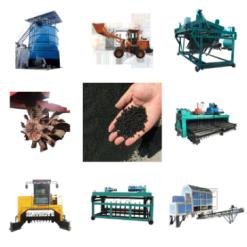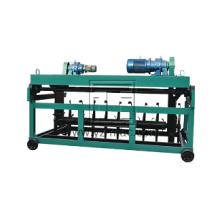Compost machine
A compost machine is a specialized piece of equipment designed to efficiently process organic waste materials and facilitate the composting process. These machines automate and streamline the composting process, providing an effective solution for managing organic waste and producing nutrient-rich compost.
Efficient Waste Processing:
Compost machines are designed to handle organic waste materials efficiently. They can process a variety of waste types, including food scraps, garden trimmings, agricultural residues, and animal manure. The machine breaks down the waste materials, creating an optimal environment for decomposition and microbial activity.
Accelerated Composting:
Compost machines accelerate the composting process by creating ideal conditions for decomposition. They provide controlled environments that regulate factors such as temperature, moisture, and oxygen levels. By optimizing these conditions, compost machines promote faster and more efficient decomposition, reducing the overall composting time.
Automatic Operation:
Many compost machines offer automatic operation, minimizing the need for manual intervention. They are equipped with sensors and control systems that monitor and regulate various parameters, such as temperature, moisture, and turning frequency. Automatic operation ensures consistent and optimal composting conditions, improving process efficiency and reducing labor requirements.
Size Reduction:
Compost machines often include components that break down the organic waste materials into smaller pieces. This size reduction process increases the surface area of the waste, facilitating faster decomposition and microbial activity. Size reduction also helps in achieving a more uniform compost mixture, enhancing the overall compost quality.
Mixing and Turning:
Compost machines incorporate mechanisms for mixing and turning the composting materials. These components ensure proper blending of the waste materials, facilitating the distribution of moisture, oxygen, and microorganisms throughout the compost pile or system. Mixing and turning promote even decomposition and help prevent the formation of anaerobic zones.
Odor Control:
Compost machines are designed to control and minimize odors associated with the composting process. They often include features such as ventilation systems, biofilters, or odor control technologies to capture and treat odorous gases. Odor control mechanisms create a more pleasant working environment and help prevent odor nuisances in surrounding areas.
Versatility and Scalability:
Compost machines come in various sizes and configurations, offering versatility and scalability to suit different needs and volumes of organic waste. They can be used for small-scale operations, such as home composting, as well as large-scale applications in commercial facilities or municipalities. Compost machines can be customized or expanded to accommodate growing waste volumes.
Nutrient-Rich Compost Production:
The primary goal of compost machines is to produce nutrient-rich compost. Through the controlled composting process, organic waste materials are transformed into a valuable soil amendment. The resulting compost is rich in organic matter, beneficial microorganisms, and essential nutrients, contributing to improved soil health and fertility.
Environmental Sustainability:
Compost machines promote environmental sustainability by diverting organic waste from landfills. By composting organic waste, greenhouse gas emissions are reduced, as composting produces less methane compared to landfill decomposition. Composting also conserves landfill space and supports the circular economy by converting waste into a valuable resource.
In conclusion, compost machines offer efficient and automated solutions for processing organic waste and producing nutrient-rich compost. They accelerate the composting process, ensure optimal composting conditions, and contribute to environmental sustainability.







